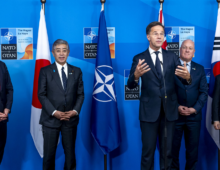|
Analysis Liquidity crisis prompts $404 million in government aid for South Korean SMEsMove addresses impact of unpaid sales proceeds from Wemakerprice and TMON but carries economic and regulatory risks John LeeJuly 30, 2024  An illustration depicting falling cash revenues | Image: Korea Pro South Korea’s finance ministry announced a $404 million (560 billion won) aid package on Monday to support small and medium-sized enterprises (SMEs) impacted by unpaid sales proceeds from e-commerce platforms Wemakeprice and TMON. While this intervention aims to address immediate liquidity issues that have affected around 60,000 sellers, it also carries risks, including inadequate regulatory oversight, long-term financial instability of the affected companies and erosion of consumer trust in the e-commerce sector. COST OF AGGRESSIVE EXPANSION Wemakeprice and TMON, two South Korean e-commerce platforms, are central to the recent liquidity crisis. Singapore-based Qoo10 acquired a majority stake in Wemakeprice in 2023, which was followed by its purchase of TMON in 2022. Qoo10’s strategy did not stop with these acquisitions. The company also acquired Interpark Commerce, a South Korean mobile shopping and book-selling platform, in March 2023 for approximately $114.9 million. It then expanded its portfolio once again in Feb. 2024 by purchasing the North America-based e-commerce platform Wish for $173 million. These moves were part of Qoo10’s broader goal to create a global e-commerce ecosystem by connecting its newly acquired platforms with its existing operations in Southeast Asia, including Indonesia, China, Hong Kong and Malaysia. The financial strain from these aggressive acquisitions soon became apparent. By May 2024, Wemakeprice and TMON were unable to pay their sellers, leading to a liquidity crisis. The unpaid bills amounted to approximately $151.6 million (210 billion won), severely impacting about 60,000 sellers. These sellers are primarily individual merchants, self-employed businesses and SMEs who depend on timely payments to sustain their operations. The broader economic impact of these disruptions could be substantial. SMEs comprise the core of the South Korean economy, accounting for 81% of employment. If a significant number of these businesses fail, the ripple effects could extend beyond the immediate e-commerce sector. Suppliers, logistics companies and service providers that depend on these SMEs may also experience financial strain.  Small businesses in South Korea, Dec. 19, 2020 | Image: Korea Pro REGULATORY SCRUTINY The crisis has also intensified regulatory scrutiny of Qoo10’s financial practices. Consumers filed a complaint about the company’s operations, focusing on potential fraud, embezzlement and breach of trust by Qoo10 executives. However, the government will also likely come under greater scrutiny. The Fair Trade Commission’s (FTC) approval of Qoo10’s acquisitions in 2023, despite concerns about market competition, will likely come under focus. In July 2023, the FTC stated that “concerns about the move disrupting competition in the related market are limited.” At that time, Qoo10’s combined market share, including TMON, was around 8.35%, far below the leading players like Naver Shopping (42.41%) and Coupang (15.91%). However, the liquidity crisis suggests potential failures in this regulatory oversight, raising questions about the thoroughness of the FTC’s review process and whether it adequately assessed the financial stability and long-term viability of Qoo10’s expansion plans. Future mergers and acquisitions in the sector may face more rigorous vetting processes to prevent similar crises. LONG-TERM IMPLICATIONS The South Korean government’s support package includes $144 million (200 billion won) in emergency management stabilization funds and $216 million (300 billion won) through cooperative programs with financial institutions. Additionally, measures such as extending loan maturities and offering tax support are intended to ease financial pressures on the affected SMEs. However, it remains to be seen if this aid package will be sufficient to address the crisis. While it provides immediate relief, the long-term effectiveness hinges on Qoo10’s ability to secure additional funds and effectively manage its global operations. Qoo10 has committed to raising $50 million in August to help mitigate the situation. Further, the company’s Chief Executive Officer Ku Young-bae said on Tuesday in an emergency meeting of the parliamentary committee on national policy that he would surrender all of his personal assets — about $58 million — to resolve the company’s liquidity crisis. But considering the government’s aid package is about seven times larger than the company’s pledge, it remains doubtful that the amount may be sufficient to fully address the liquidity shortfall. The crisis will also likely cast a shadow over future initial public offering prospects for TMON and other entities under Qoo10’s umbrella. TMON had previously announced plans to go public to secure stable capital but failed to do so due to competition from other platforms such as Coupang and Naver.  Kim Beom-seok (left), South Korea’s First Vice Minister of Economy and Finance, presides over a meeting to discuss a liquidity support plan to aid SMEs impacted by Wemakeprice and TMON’s liquidity crisis, July 29, 2024 | Image: ROK Ministry of Economy and Finance Moreover, the liquidity issues and subsequent government intervention have eroded investor confidence, making it challenging for these entities to attract investment in the near term. The broader implications for investor trust in the e-commerce sector are significant. This crisis has exposed the vulnerabilities of rapid expansion strategies without adequate financial safeguards. Investors may become more cautious, demanding higher levels of due diligence and risk assessment before committing capital to e-commerce ventures. This heightened scrutiny could slow down growth and innovation in the sector, as companies may need to prioritize financial stability over aggressive expansion. While the government’s support package may address immediate financial needs, the long-term financial stability of Wemakeprice, TMON and Qoo10 remains uncertain. Moreover, Qoo10’s liquidity crisis has significant implications for cross-border investments. As a Singapore-based company with substantial operations in South Korea and other parts of Asia, Qoo10’s financial instability may deter international investors. The crisis has prompted scrutiny from South Korean regulators, and this regulatory attention will likely extend internationally. Given Qoo10’s global operations, international regulatory bodies may align their efforts to ensure comprehensive oversight. The Financial Supervisory Service in South Korea has already dispatched inspection teams to evaluate the company’s financial practices. Similarly, regulators in other countries where Qoo10 operates may increase their scrutiny to prevent similar issues from arising within their jurisdictions. GOING FORWARD As the South Korean government deploys its $404 million aid package, there will likely be heightened regulatory scrutiny and possible new regulations aimed at preventing similar crises. The FTC’s approach to future mergers and acquisitions will also likely become more stringent, with a greater emphasis on financial stability and risk management. For Qoo10, the focus will be on securing additional funds and restoring financial health while navigating ongoing investigations and potential litigation. However, it remains uncertain if the company or any of its affiliates will be able to regain consumer and investor trust. Edited by Alannah Hill South Korea’s finance ministry announced a $404 million (560 billion won) aid package on Monday to support small and medium-sized enterprises (SMEs) impacted by unpaid sales proceeds from e-commerce platforms Wemakeprice and TMON. While this intervention aims to address immediate liquidity issues that have affected around 60,000 sellers, it also carries risks, including inadequate regulatory oversight, long-term financial instability of the affected companies and erosion of consumer trust in the e-commerce sector. Get your
|
|
Analysis Liquidity crisis prompts $404 million in government aid for South Korean SMEsMove addresses impact of unpaid sales proceeds from Wemakerprice and TMON but carries economic and regulatory risks  South Korea’s finance ministry announced a $404 million (560 billion won) aid package on Monday to support small and medium-sized enterprises (SMEs) impacted by unpaid sales proceeds from e-commerce platforms Wemakeprice and TMON. While this intervention aims to address immediate liquidity issues that have affected around 60,000 sellers, it also carries risks, including inadequate regulatory oversight, long-term financial instability of the affected companies and erosion of consumer trust in the e-commerce sector. © Korea Risk Group. All rights reserved. |











